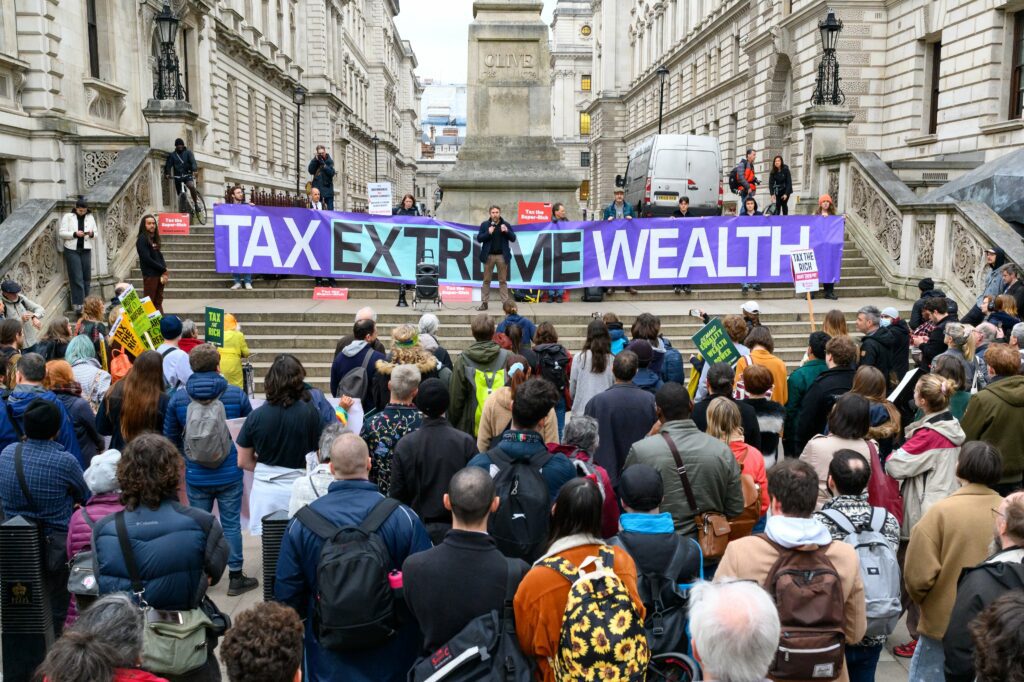
Why Do We Keep Ignoring Inequality?
This guest blog was written by our Trustees Yamini Cinamon Nair and Tom Allanson (Co-Chairs of the Board), and Kate Pickett and Richard Wilkinson (Co-founders and Patrons) as part of Trustees Week. This week is intended to celebrate the huge contributions our trustees make to the Equality Trust – so we started by asking them to make another by writing about their thoughts, feelings, and beliefs about inequality.
Eroding trust, crumbling cohesion, deepening divides – inequality is the real problem
The UK is very unequal. We live in the 6th most unequal country by income of the OECD countries.1 The top 10% of earners in the UK captured 36% of the income share in 2021, compared to only 20% captured by the bottom 50% of UK earners.2

Why does inequality matter?
Inequality has profound social and political consequences. It shapes how people relate to each other and the democratic institutions by which we are governed.
Social cohesion
High inequality weakens the social fabric and sense of cohesion between us. We are more likely to live, work and socialise in socially and economically segregated ways which can aid misunderstanding, resentment, and undermine the sense of shared identity and purpose needed for a cohesive society.
Social ‘bridging’ across socioeconomic groups is important for encouraging the exchange of ideas, cooperation and new perspectives across groups. High inequality can reinforce within-group ‘bonding’, fostering a ‘we’ versus ‘them’ mentality, as well as creating status anxiety and negative social comparisons.3
Democratic trust
Research consistently shows that societies with higher inequality also experience low levels of trust in democratic institutions and higher political polarisation. High levels of inequality can and do lead to unequal distributions of political power and have corrosive effects on citizen trust.
According to The Economist’s Democracy Index, countries with lower levels of income inequality tend to have stronger democratic governance, while highly unequal countries score significantly lower.4 People may also feel that their political systems do not represent them, or they are ‘rigged’ in favour of the economic elite, leading to distrust, disengagement and ultimately a cynical view on the possibility of change.
What is The Equality Trust’s mission?
Our mission is to dismantle inequalities of income, wealth and power in the UK. The evidence is clear: inequality is damaging our society and economy. We lead research, run campaigns, and work with communities to build a more equal society that works better for everyone.



Now more than ever, this work is needed. Inequality is shaping every part of life in the UK – eroding trust and deepening divides. Politics is increasingly polarised and influential actors take advantage of the extent of inequality to sow division between groups. Inequality is the missing link in understanding why so much feels broken, and what must change to build a fairer future.
The Equality Trust publishes reports detailing the scale of inequality in the UK, such as Billionaire Britain, exposing the elite capture of our society. We train community economists to reshape narratives about what the economy is and who it is for. We use co-production methods to listen to lived experience and rebuild citizen trust in our democratic systems. We support local councils and national government in implementing the Socioeconomic Duty to protect people at the harsh end of inequality.
We believe in a new politics of hope – a vision that shows another future is possible. This scale of inequality is not inevitable. Together, we can build a more cohesive, more equal society.
Fund Our Work
We’re fighting against obscene wealth and power. All our work is possible thanks to people like you. Donate one hour’s wage per month – or whatever you can afford – to help build a more equal UK.
Spread the Word
Help share news on inequality, stats, and campaign launches on social media
- Organisation for Economic Co-operation and Development (2022). Income inequality. Available at https://www.oecd.org/en/data/indicators/income-inequality.html [Accessed 02/11/2025] ↩︎
- Chancel, L., Piketty, T., Saez, E., Zucman, E. et al. (2022). World Inequality Report 2022, World Inequality Lab. Available at https://wir2022.wid.world/download/ [Accessed 02/11/2025] ↩︎
- Pickett, K., Gauhar, A., Wilkinson, R. & Sahni-Nicholas, P. (2024). The Spirit Level at 15. London: The Equality Trust. DOI: https://doi.org/10.15124/yao-de9s-7k93Wilkinson, R., & Pickett, K. (2009). Income inequality and social dysfunction. Annual Review of Sociology, 35(1), 493–511. https://doi.org/10.1146/ammrev-soc-070308-115926 ↩︎
- Economist Intelligence Unit (2025). Democracy Index 2024. Available at https://www.eiu.com/n/campaigns/democracy-index-2024/ [Accessed 02/11/2025] ↩︎